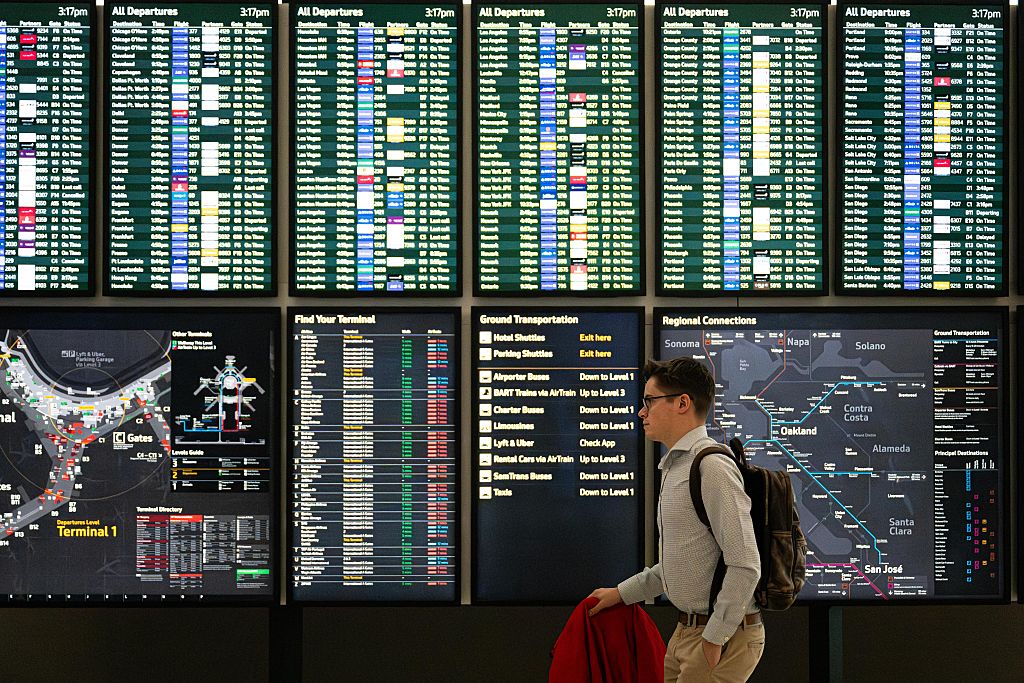If you’re traveling somewhere for the Thanksgiving long weekend, brace yourself.
This week is expected to be the busiest Thanksgiving holiday travel period in 15 years, with more than 360,000 flights set to travel through the U.S., according to the Federal Aviation Administration (FAA). And while the surge of flight delays and cancellations driven by the government shutdown appears to have ended, inclement weather is forecasted to sweep through much of the country in the days leading up to the long weekend, which could disrupt air travel.
[time-brightcove not-tgx=”true”]
Travelers are also set to flock to the country’s railroads and highways, where they may be faced with crowds or potential disruptions. Amtrak predicted that this year will be a record-breaking Thanksgiving travel season, and the American Automobile Association estimated that nearly 82 million people will travel at least 50 miles from their homes this week.
Here’s what you should know to prepare yourself if you’re traveling this week.
How busy are airports going to be?
The peak travel day is likely to be Tuesday, Nov. 25, the FAA said, with more than 52,000 flights scheduled for that day alone. But the agency assured the public that it’s prepared for the busy travel period.
“Thanks to the dedication of our air traffic controllers and every FAA employee, we are ready for the holiday rush and take pride in helping travelers reach their friends and families during this important time of year,” FAA Administrator Bryan Bedford said in a press release. “I am deeply grateful to our entire FAA team. Even through a period of record-high traffic, their unwavering commitment keeps the system running safely.”
This holiday season comes on the heels of the longest government shutdown in U.S. history. Before the shutdown ended earlier this month, the staffing shortages it contributed to at airports led to disruptions in air travel across the country. Transportation Secretary Sean Duffy announced sweeping cuts to flights at 40 major airports during the shutdown due to air traffic control safety concerns, but on Nov. 16 announced that he was lifting all restrictions and that the air traffic system would resume normal operations.
While flights have continued to see disruptions in the days since, Sheldon Jacobson, an aviation security and safety expert and professor of computer science at the University of Illinois Urbana-Champaign, told TIME last week that the delays were “nothing unusual.”
Could the weather impact your flight or drive?
Heavy rain, which could lead to flooding, is expected to hit states including Texas, Arkansas, Louisiana, and Mississippi on Monday, potentially disrupting travel at major airports in cities including Dallas, Houston, and Kansas City, according to The Weather Channel.
By Tuesday, fog could roll in from the Northeast to Florida, and even parts of the Midwest, which The Weather Channel warned could lead to delays at airports, including in Atlanta, Chicago, New York City, and Philadelphia. More rainfall is also expected to hit Midwestern and Southeastern states, as well as the East Coast. Parts of the Northern Plains may also see some snowfall, which could affect driving on some interstates, including Interstate 94 northwest of the Twin Cities into North Dakota.
Rain could continue to fall in parts of the eastern U.S. on Wednesday, potentially leading to delays at airports in Boston, New York City, Philadelphia, Seattle, and Washington, D.C., according to The Weather Channel. Heavy rainfall could also hit parts of Washington and Oregon, and snowfall could affect parts of Michigan, Wisconsin, Ohio, and Pennsylvania on Wednesday.
On Thanksgiving Day, snowfall is forecasted to reach the Great Lakes snowbelts, affecting parts of major interstates, including Interstate 90 from Cleveland to near Buffalo, Interstate 81 north of Syracuse, and Interstates 94 and 196 in western Michigan, according to The Weather Channel. Flights, particularly coming in and out of Seattle, could be affected by the weather that day.
What should I do if my flight is delayed or canceled?
Get to the airport early, since it’s likely going to be busy this week. And continue checking the status of your flight to stay up-to-date on any disruptions.
If your flight is canceled, contact your airline’s customer service line, visit their website, or go to their in-person help desk at the airport. Your airline will rebook you on another flight if your flight is canceled.

